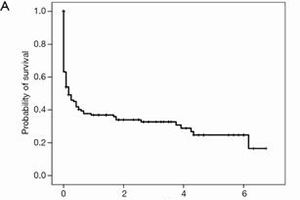Inter-hospital transfer of extracorporeal membrane oxygenation-assisted patients: the hub and spoke network
Abstract
Background: The treatment of cardiogenic shock (CS) in peripheral hospitals may be challenging when acute mechanical circulatory support (MCS) is not available. Tertiary care centers may provide mobile extracorporeal membrane oxygenation (ECMO) teams to support the treatment of CS-patients externally.
Methods: We retrospectively analyzed our single-center experience with a mobile ECMO team focussing on decision-making and survival data of CS-patients retrieved by ECMO support from peripheral hospitals to our tertiary care center between January 2012 and October 2018.
Results: A total number of 134 CS-patients have been retrieved by ECMO support to our center within the observation period. Forty-three (32%) died on the acute MCS device, while 59 (44%) patients could be weaned from the acute MCS. Twenty-nine (22%) were bridged to implantation of a durable MCS system and 6 were finally transplanted. The overall 1-year survival was 33%. Interestingly, advanced patient age did not significantly affect survival.
Conclusions: Acute MCS for CS may be provided by experienced mobile teams allowing for retrieval of patients from peripheral hospitals to tertiary care centers. Relatively low survival rates oppose intensive material and human resources. It is therefore mandatory to constantly refine logistics and selection criteria.
Cover






